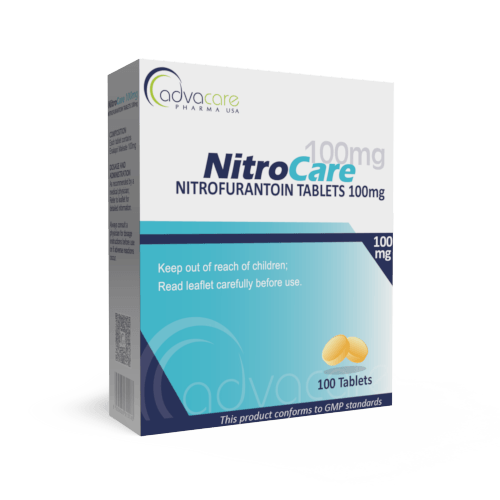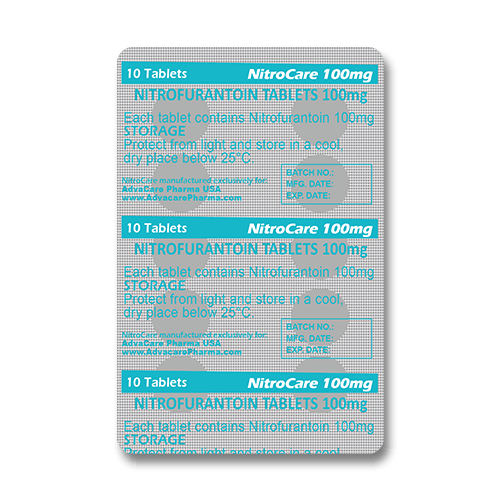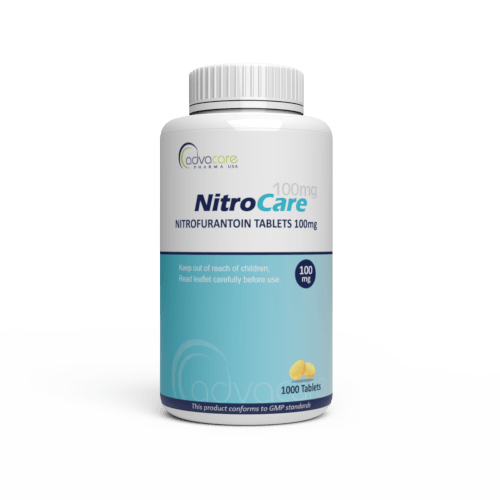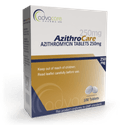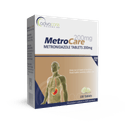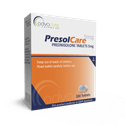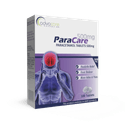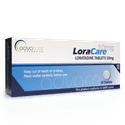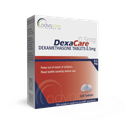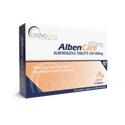- Home›
- Pharmaceuticals›
- Pharmaceutical Tablets›
- Nitrofurantoin Tablets
Nitrofurantoin Tablets
Dosage
Packaging
What is Nitrofurantoin?
Active Ingredients: Nitrofurantoin
Nitrofurantoin Tablets are an antibiotic drug used to treat and prevent certain types of urinary tract infections (UTIs). It is effective against infections caused by Escherichia coli, Enterococcus, Klebsiella, Staphylococcus aureus, and Staphylococcus saprophyticus. This drug may be prescribed to treat pyelitis.
As with all antibiotics, nitrofurantoin will not work against viral infections like the common cold or flu.
Nitrofurantoin is classified as a nitrofuran antibiotic. It works by disrupting essential intracellular components of the bacteria.
Nitrofurantoin is reduced by bacterial flavoproteins into toxic intermediates, which bind to bacterial ribosomes and enzymes. This inhibits the citric acid cycle required for aerobic metabolism and DNA, RNA, protein, and cell wall synthesis. This interference with vital biochemical processes leads to bacterial death. Nitrofurantoin’s various mechanisms of action make it difficult for bacteria to acquire resistance to nitrofurantoin treatment.
AdvaCare Pharma is a producer and exporter of Nitrofurantoin Tablets and Capsules. We offer a wide range of high-quality and cost-effective medications that are available for distribution. Our supply chain is thoroughly vetted to ensure it meets health, safety, and environmental standards.
Why are we a top Nitrofurantoin manufacturer?
AdvaCare Pharma is a trusted Nitrofurantoin manufacturer committed to providing quality-assured, cost-effective pharmaceuticals for an ever-changing global market. Manufacturing a wide range of 200+ pharmaceutical products in tablet form, we ensure that all of our oral solid dosage forms adhere to stringent GMP standards.
We operate according to a unique "vested supplier-distributor relationship" business model, in which we tie our success in a market to that of our distributor. Such a model facilitates a closer relationship by working together to achieve pre-defined goals for market entry and expansion. As a Nitrofurantoin manufacturer and global supplier, we implement unique strategies to ensure successful distribution.
Uses
What is Nitrofurantoin used for?
It is used to treat and prevent certain types of urinary tract infections (UTIs).
Nitrofurantoin does not treat viral infections, such as the common cold or flu.
How should Nitrofurantoin Tablets be used?
This medication is intended to be taken orally. It can be taken with food to enhance tolerance and absorption. Do not take with antacids containing magnesium trisilicate. Nitrofurantoin Tablets should be taken for the full duration of treatment, even if symptoms improve early on. Skipping doses or discontinuing treatment prematurely may increase the risk of developing bacterial infections that are resistant to current and future treatments.
What dose should be taken and for how long?
Adults For preventing UTIs, the recommended dose is 50-100mg, taken once at bedtime for the duration of treatment prescribed.
For treating UTIs, the usual dose is 50-100mg, taken four times a day for 7 days.
Children (≥ 1 month) For preventing UTIs, the recommended dose is 1mg/kg/day, taken in one or two divided doses for the duration of treatment prescribed. Do not exceed doses of 100mg/day.
For treating UTIs, the usual dose is 5-7mg/kg/day, taken in four divided doses a day for 7 days. Do not exceed doses of 400mg/day. Children weighing 42kg or more may take the adult dose.
The dosage is based on medical condition, response to treatment, age, and weight. Refer to a doctor or pharmacist for more specific guidelines on dosage. Do not exceed what they advise.
Who can use Nitrofurantoin?
Nitrofurantoin can be administered to adults and children (≥ 1 month), but caution is advised for those who are:
Pregnant Animal studies have not found evidence of fertility impairment or fetal harm associated with the administration of exceedingly large doses of nitrofurantoin. One study found evidence of delayed fetal growth and a low incidence of malformations at doses 68 times the human dose and no fetal malformations at 25 times the human dose. Human studies are not adequate to rule out risk, and it is unclear if nitrofurantoin is safe to use during pregnancy.
Due to the risk of hemolytic anemia, nitrofurantoin is contraindicated at term (38 to 42 weeks gestation), when labor onset is imminent, or during childbirth.
Nursing Nitrofurantoin is excreted in human milk in small amounts. Due to the potential for adverse infant events, either nursing or nitrofurantoin may need to be discontinued, based on the patient’s clinical need.
Pediatric Due to the risk of hemolytic anemia, nitrofurantoin is contraindicated in neonates (< 1 month).
Geriatric Clinical studies did not include enough older adults (≥ 65 years) to determine whether they respond differently than younger adults (< 65 years). Other clinical experiences have not reported differences in responses. Due to the increased risk of renal toxicity in older patients, doses should be adjusted based on creatinine clearance, and renal function monitoring is encouraged.
Likely related to age-related decreases in organ function, older adults reported greater incidences of pulmonary and hepatic reactions, some of which have been fatal.
Other warnings
Administering nitrofurantoin in the absence of a proven or strongly suspected bacterial infection or prophylactic indication is unlikely to provide any clinical benefit and increases the risk of developing drug-resistant bacterial infections.
Adverse hepatotoxic events, such as abnormal liver function, hepatitis, cholestatic jaundice, hepatic necrosis, and hepatic failure, have been reported, some of which have resulted in death. Patients should be monitored periodically, and nitrofurantoin should be discontinued immediately upon any signs and symptoms of hepatitis.
In patients with significant renal insufficiency, nitrofurantoin is contraindicated.
Acute, subacute, or chronic pulmonary reactions have been reported with nitrofurantoin use. Acute pulmonary reactions, such as cough, chest pain, dyspnea, fever, chills, eosinophilia, and pulmonary infiltration with consolidation or pleural effusion on x-ray, typically manifest within the first week of treatment and are reversible with treatment cessation. Chronic pulmonary reactions, such as dyspnea on exertion, cough, and altered pulmonary function, can develop without warning. Manifestations of diffuse interstitial pneumonitis or fibrosis can also be found with radiological and histological testing. These reactions are rare, potentially fatal, and generally associated with patients receiving long-term (≥ 6 months) treatment. Close monitoring of pulmonary condition in such patients is warranted. Pulmonary effects may not be reversible after treatment cessation.
Peripheral neuropathy, which may be severe, irreversible, or fatal, has been reported. The risk of these effects is increased in patients with renal impairment, anemia, diabetes mellitus, electrolyte imbalances, vitamin B deficiency, and debilitating diseases.
Cases of hemolytic anemia have been induced as a result of nitrofurantoin treatment. Hemolysis appears to be linked to a glucose-6-phosphate dehydrogenase deficiency in the red blood cells of the affected patients. If hemolysis occurs, nitrofurantoin should be discontinued, and hemolysis typically resolves with discontinuation.
Clostridium difficile-associated diarrhea (CDAD) has been reported with use of nearly all antibiotic agents, including nitrofurantoin, and may range in severity from mild diarrhea to fatal colitis. Treatment with antibiotics alters the flora of the colon, which can lead to overgrowth of C. difficile. Certain strains of C. difficile can cause increased morbidity and mortality. Patients presenting with diarrhea up to weeks or months after the completion of nitrofurantoin treatment should be monitored for CDAD. If CDAD is suspected or confirmed, ongoing antibiotic use not intended to treat C. difficile may need to be discontinued. Appropriate fluid and electrolyte management, protein supplementation, antibiotic treatment of C. difficile, and surgical evaluation should be instituted as clinically indicated.
Hypersensitivity reactions, including angioedema, skin eruptions, pruritus, urticaria, anaphylaxis, arthralgia, myalgia, fever, and vasculitis, have been reported with nitrofurantoin use.
Uricosuric drugs, such as probenecid and sulfinpyrazone, can inhibit renal clearance of nitrofurantoin. The increased nitrofurantoin serum levels may increase toxic effects, and the decreased urinary levels could lessen its efficacy as a urinary tract antibacterial.
Nitrofurantoin may result in false-positive reactions for urine glucose when using nonenzymatic methods. Tests based on enzymatic glucose oxidase reactions should be used while receiving nitrofurantoin treatment.
Side Effects
As with all pharmaceuticals, some unwanted effects can occur from the use of Nitrofurantoin Tablets.
Common side effects include, but may not be limited to:
- nausea
- vomiting
- loss of appetite
- headache
Serious side effects may include:
- signs of lung problems
- signs of liver or gallbladder problems
- signs of blood problems
- severe headaches
- signs of an allergic reaction
For a comprehensive understanding of all potential side effects, consult a medical professional.
If any symptoms persist or worsen, or you notice any other symptoms, please call your doctor immediately.
Precautions
Do NOT use Nitrofurantoin Tablets if:
- You are allergic to any of the ingredients.
- You are pregnant or breastfeeding.
- You have severe renal failure or disease.
Before treatment, consult your doctor regarding any medications you are taking to address potential drug interactions.
This medication may not be suitable for people with certain conditions, so it is important to consult with a doctor if you have any health conditions.
Nitrofurantoin Tablets are not suitable for children under 1 month of age.
References
Randomised controlled trial of nitrofurantoin versus placebo in the treatment of uncomplicated urinary tract infection in adult women
The objective of this research was to assess the short-term symptomatic and bacteriological effects of nitrofurantoin compared to placebo in treating uncomplicated UTIs in adult non-pregnant women.
This is a randomized placebo-controlled trial conducted in general practice settings. It included non-pregnant women aged 15-54 years presenting with symptoms suggestive of uncomplicated lower UTI and positive for pyuria (leucocyte esterase test).
Patients were randomized to receive nitrofurantoin 100mg or placebo four times daily for three days. Follow-up dipslides and symptom assessments were conducted after three, seven, and 14 days.
The results showed that of the 166 women with suspected UTI, 78 had pyuria and were included in the study (clinically suspected UTI group); 40 received nitrofurantoin, and 38 received placebo. After three days, combined symptomatic improvement and cure rates were higher in the nitrofurantoin group (27/35) compared to placebo (19/35; P = 0.008; number needed to treat [NNT] = 4.4, 95% confidence interval [CI] = 2.3 to 79). Nitrofurantoin resulted in higher bacteriological cure rates after three days (21/26) compared to placebo (5/25; P < 0.001; NNT = 1.6, 95% CI = 1.2 to 2.6).
The conclusion of this study is that nitrofurantoin was more effective than placebo in achieving bacteriological cure and symptomatic relief in women with bacteriologically proven UTIs within three days.

You might be interested in...
Why AdvaCare Pharma?
As an industry leader, we are aware of our responsibility to provide affordable and sustainable solutions to improve healthcare worldwide.
